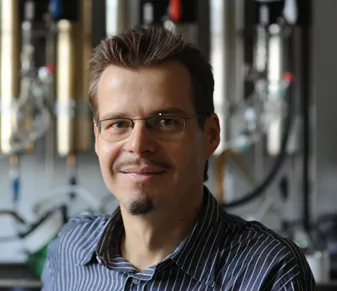When
Presenter
Dalibor Sames
Professor of Chemistry, Department of Chemistry, Columbia University & The Zuckerman Mind Brain Behavior Institute at Columbia University
Abstract:
In this lecture I will discuss our mechanistic and drug discovery efforts inspired by ibogaine, the major psychoactive alkaloid of the iboga tree native to Africa. Ibogaine is mostly known for its unique drug addiction interrupting effects, which inspire a radically different treatment of opioid use disorder and other substance use disorders. However, new emerging clinical evidence also indicates that ibogaine may ultimately show broad therapeutic efficacy across psychiatric and neurological indications such as PTSD and traumatic brain injury (TBI). Acutely, ibogaine induces dream-like subjective states that facilitate experiences of immersive memory recall, trauma processing, and representations of apparent neurorestorative processes. Currently, there is no coherent molecular explanatory model for the broad array of rapid and lasting effects induced by ibogaine, owing to its highly complex polypharmacological profile. I will describe our work across synthesis, in vitro and in vivo pharmacology, and animal behavior, as well as our efforts to construct a global mechanistic hypothesis of ibogaine. I will also present novel iboga analogs with defined molecular signaling and improved cardiac liabilities. To contrast the putative mechanisms of ibogaine, I will present our work on classic psychedelics and their close non-hallucinogenic analogs. Finally, I will discuss mechanistic ideas that compare and contrast iboga alkaloids, classic psychedelics, and mitragyna alkaloids, each representing new treatment options for opioid dependence and other psychiatric disorders. The discussed research advances will be placed in the context of current and historical impact of psychoactive substances on science, medicine, culture, and society.
Bio-sketch:

Professor Sames studied chemistry at Charles University in Prague and the University of Arizona in Tucson (M.A. and Ph.D.) and pursued postdoctoral research as the Michael R. Bloomberg Fellow of the Irvington Institute of Immunology at The Memorial Sloan-Kettering Cancer Center in New York. He has built his independent research program at Columbia University in New York City in several areas of research, including the development of a new logic in chemical synthesis of complex organic materials (based on direct functionalization of C-H bonds), introduction of novel synaptic imaging agents (FFNs or fluorescent false neurotransmitter), elucidation of a molecular mechanism of the antidepressant tianeptine and the psychoactive plant kratom, and study of ibogaine and iboga alkaloids as unique prototypes of novel neurotherapeutics. Dr. Sames has received numerous awards, for example The Alfred P. Sloan Fellowship Award, The McKnight Technological Innovations in Neuroscience Award, and The Pfizer Award for Creativity in Organic Synthesis. Dr. Sames is a co-founder of Gilgamesh Pharmaceuticals and Kures, Inc, start-up pharmaceutical companies that bring some of the inventions to clinical research and drug development.
Hosted by: Dr. Robin Polt






